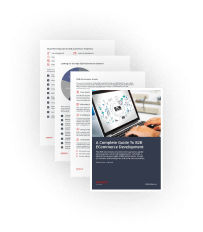While continuously growing and expanding, the modern web market creates more challenges and a highly competitive space for both small web shops and large virtual shopping malls. Therefore, if you’re going to start your own eCommerce project, choosing a unique business strategy is essential to gain the competitive edge. With your specific ideas, products and deals, it becomes evident that an eCommerce platform to build your own online store has to be unique as well. This is where custom eCommerce software developers come into play.
There are plenty of eCommerce software development companies operating in the market today. This might be a real challenge for you to choose the optimal contractor in terms of the expertise level, flexibility and service costs. Here we’ll examine what eCommerce software development is made of and how you can benefit from working with us.
What Is eCommerce Software?
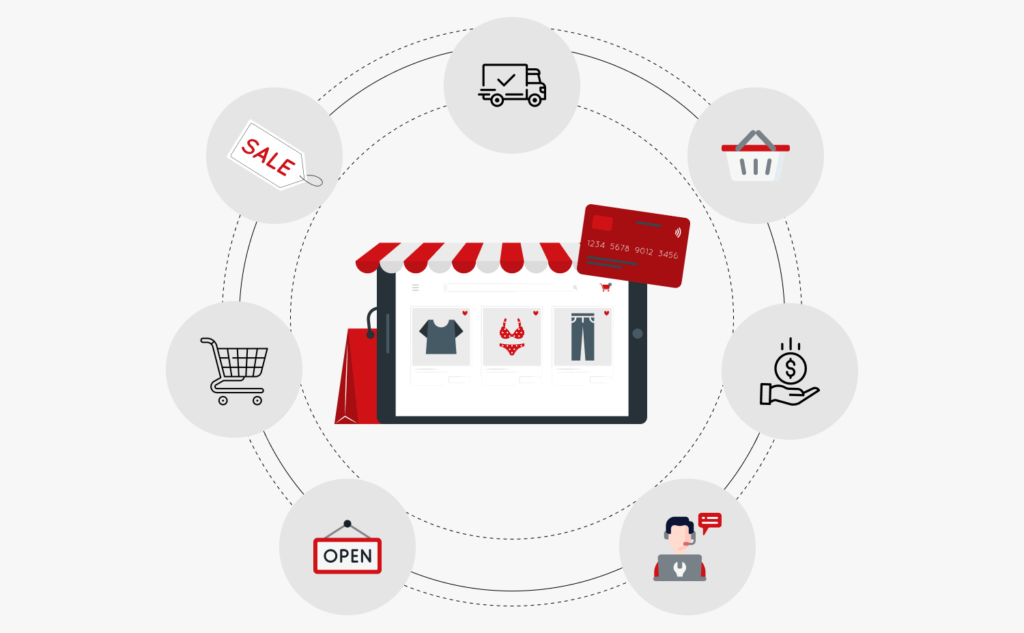
eCommerce software is a platform to set up an online store/marketplace and manage its operation. The platform offers many features: a self-service portal, website design, product listing, online payment processing, sales reporting, supply chain management, and customer relationship management (CRM).
eCommerce Software Development
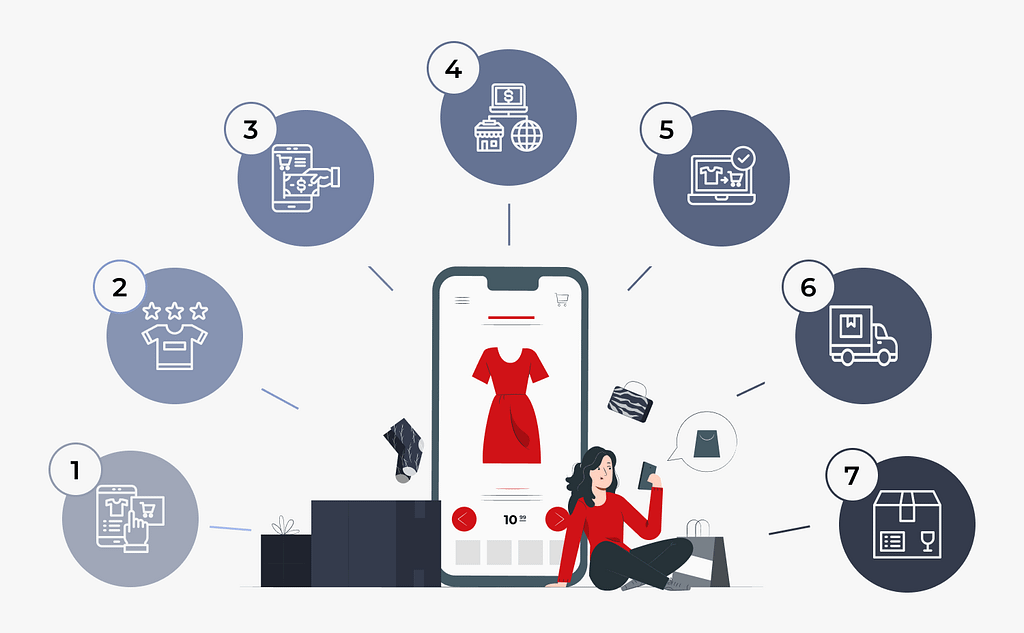
eCommerce Software Development is a process of creating and maintaining eCommerce websites and applications that ensure digital transformation of businesses and facilitate online transactions between companies and their clients. This involves designing and building user-friendly interfaces, integrating payment gateways, managing product catalogs, mobile app development, and ensuring security and performance.
There are several popular eCommerce software platforms which offer customizable solutions for eCommerce websites. There are also many development frameworks and APIs available for developers to build custom eCommerce applications from scratch.
Why Do You Need eCommerce Software Development?
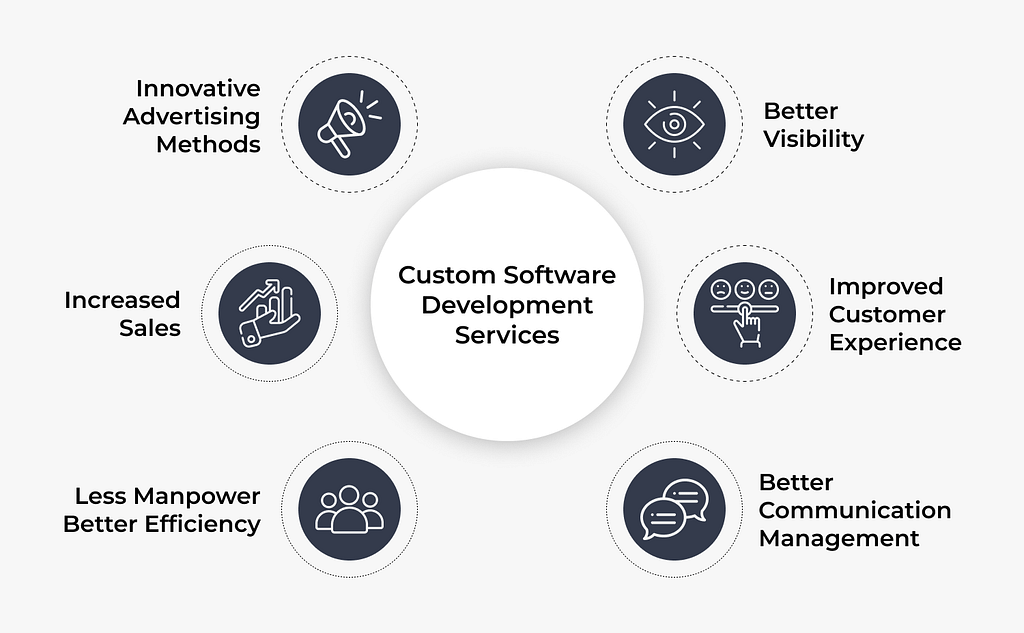
eCommerce software development allows you to build your eCommerce website, providing your business with an online presence that enables you to sell your products 24/7.
Here are some other reasons why you need eCommerce software development for your business:
- Boosts Sales: eCommerce software development is essential for businesses as it helps to increase sales. An online store is open all day and night, and customers can browse and purchase products at their convenience. This helps to increase sales and revenue for businesses.
- Cost-effective: Building an eCommerce website may be cheaper than possessing a brick-and-mortar store. However, there is no one-cure-all method here. An online store is primarily useful for owners of standardized goods and services. For example, it is much easier to sell cell phones and car parts from virtual shelves than, say, clothes or shoes that need to be tried on.
- Improved customer experience: having online presence is a must today. If you run an offline store, an online store can supplement your retail success, as customers can do preliminary research of your assortment before coming and buying something from you.
- More efficient business processes: with all tools connected to your online store, any activity becomes very transparent. When data is recorded and automated, they can be measured and managed. Greater vision of your business leads to enhanced efficiency.
- Improved inventory management. When eCommerce software is responsible for stock management, you don’t bother about mistakes. Stock availability will be always up-to-date as the process is almost automated.
- Access to valuable customer data for marketing purposes: ready-made eCommerce software solutions come with marketing tools out-of-the-box. The only thing you need is to set them up and track data about customers.
Overall, e-Commerce software development is a necessary step for any business that wishes to succeed in the world of online retail.
Features For Successful eCommerce Website Software
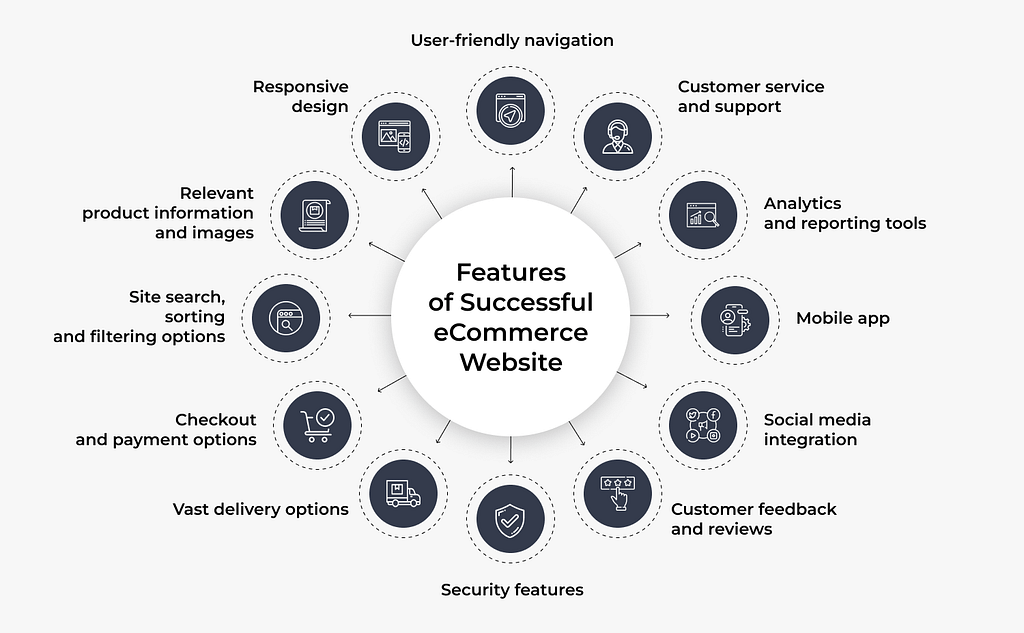
Most ready-made eCommerce platforms already have everything to start an eCommerce business with minor tweaks. However, here is a list of the features to perfect your site:
- User-friendly navigation
- Responsive design
- Relevant product information and images
- Site search, sorting and filtering options
- Checkout and payment options
- Vast delivery options
- Security features
- Customer feedback and reviews
- Social media integration
- Mobile app
- Analytics and reporting tools
- Customer service and support
The choice of the platform and functionality and their further refinement will significantly depend on the niche the business operates in. For example, NFT marketplaces don’t require integration with shipping systems, as no physical item is delivered. The same is with service platforms such as rental sites, freelance platforms or e-learning marketplaces. In contrast, while drafting a task specification for a fashion online store, you need to cater for providing all kind of delivery and payment options.
To do the choice of the core platform and key features of your future eCommerce site right, it is better to hire experienced online store and eCommerce marketplace developers and designers. Below are 4 steps awaiting you when opting for a perfect eCommerce site development.
5 Steps For Developing Custom eCommerce Software
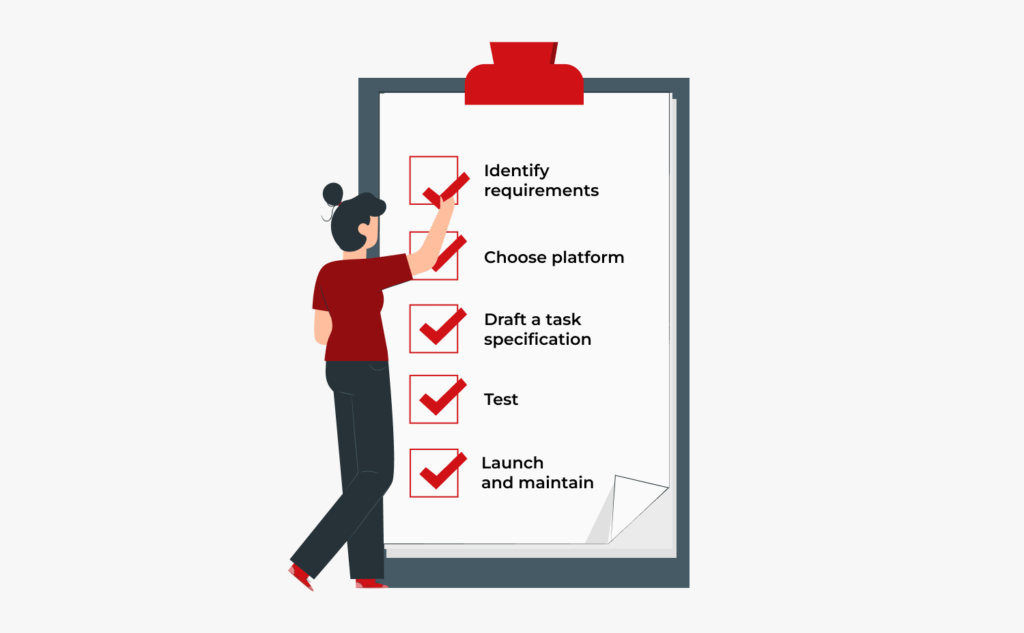
Here are basic steps when you want to launch an online store:
- Identify and prioritize your business requirements and objectives
- Choose the appropriate eCommerce platform and software developer
- Draft a task specification with clear deliverables, including:
- Task to create a user-friendly and responsive website design
- Task to integrate/improve essential features and functionality such as checkout process, payment gateway integration, and shopping cart management
4. Test the site to fix malfunctions and discrepancies.
5. Launch and maintain the eCommerce software to ensure seamless performance and customer satisfaction.
Let’s examine some activities in more detail.
Choosing a CMS
It is important to close this task before development begins. Once CMS is chosen, it will be impossible to undo the decision. For most standard projects, there are ready-made eCommerce platforms capable of covering the basic tasks of online stores.
When choosing an eCommerce platform, you have 3 options: popular CMSs with online store functionality, dedicated eCommerce platforms and self-written code. The first two options are ideal for 80-90% of eCommerce businesses, the remaining 10-20% are non-standard projects with business needs that cannot be covered by ready-made solutions. It is necessary to take into account the scale of the website. If the advertising budget allows you to attract thousands of visitors every day, then you should pay attention to frameworks that can handle a high load well. For example, CS-Cart withstands 10 thousand unique users per day. After you opted for a platform, find a developer capable of customizing the default functionality.
Signing a Technical Specification with the chosen developer
Technical specification is the foundation on which successful cooperation between the customer and the developer rests. The document describes all the tasks that the programmer must implement: from the “framework” of the site to the connection of payment aggregators. Anything outside the scope of the document won’t be done, so be sure you included all your requirements. Alternatively, you may opt for the dedicated development. It is cost-rational when the project is large or your requirements are still vague, so you need expert guidance from business and system analysts.
Creating UX design, layout development, and design integration
Layout development involves several aspects, such as the selection of colors, typography, images, animations, and the placement of these elements on the screen.
Some of the key considerations in layout development include:
- Choosing an appropriate layout type, such as grid-based or responsive design
- Defining the hierarchy and grouping of content elements
- Applying color and typography to improve readability and aesthetics
- Testing and optimizing the layout for different devices and user scenarios
If you want to create a visually appealing eCommerce website, find an experienced designer and work in a team.
After completing the work on the front-end development, the most crucial moment comes – turning the picture into a “live” site, which will be the basic prototype of the future project.
The layout of the site clearly shows all the shortcomings that may be in the layout. After preparing all the pages, the developer should hold a working session with the customer and jointly check the sections of the future site for mistakes or inconsistencies.
eCommerce platform setup and connecting plugins
After the layout is prepared for further work, we proceed to the process of fine-tuning the eCommerce platform.
At this stage, it becomes clear which tasks will take more time than planned. It may turn out, for example, that the appearance envisaged in design goes beyond the standard capabilities of the eCommerce platform. You will need an additional development or an add-on that will help you add more features from the layout to the working site.
After completing the main tasks, it’s time to connect additional plugins that may be needed to bring the project to the final release. The aim of eCommerce software integration is to streamline business operations and improve overall efficiency, while also enhancing the customer experience. The list of the most frequently used solutions includes integration with shipping providers, payment aggregators, CRM or ERP systems, warehouse management or accounting add-ons.
It is necessary to determine the list of systems and plugins that will be needed to close all tasks from the task specification before starting development. If you do this later, it may turn out that there are no ready-made modules, and the project budget will increase by 50%.
Final revision
The last step is to check the functionality of the online store. It is required to test its behavior under high load and understand how well the current hosting copes with stressful situations. Only after all site processes are debugged to an ideal state, it is ready for release.
Simtech Development Will Help You With eCommerce Software Development
In accordance with your individual business needs and store specifications, our eCommerce software developers will integrate any necessary custom options, tools and applications, like extra payment services, web analytics, third-party data feeds, ERP synchronization, etc. We also deliver fast eCommerce software integration directly to your web server, so that you can get your online store up and running in a few days only.
Simtech Development is an eCommerce software development company with 17+ years of experience that specializes in building sophisticated, full-fledged eCommerce systems and websites of any size and complexity, even with the most advanced requirements. Since 2005 we have already created hundreds of unique eCommerce projects we are extremely proud of. Our clients are successful, dynamically growing retail businesses from over 150 countries all over the world. Highly skilled, creative staff, vast field experience, solid track record and comprehensive eCommerce software development services backed by unmatched flexibility and affordable pricing models make Simtech Development a viable choice for online business owners with any specific needs and budget restrictions.
Our team consists of the best CS-Cart developers and designers who are able to provide a complete range of custom eCommerce development software solutions with the main focus on delivering high quality services, meeting all client ideas and requirements in full. We are ready to create an exclusive eCommerce system based on any of CS-Cart editions – CS-Cart Software or Multi-Vendor Software.
FAQ about eCommerce Software Development
What is the cost of custom eCommerce software development?
The cost of custom eCommerce development can vary depending on the complexity of the project, the features required, and the experience of the development team. Businesses should expect to pay anywhere from a few thousand dollars to tens of thousands of dollars for custom eCommerce development.
How long does it take to develop a custom eCommerce website?
It all depends on the case. In general, businesses should expect the development process to take anywhere from a few weeks to several months.
What are the benefits of custom eCommerce development?
Custom eCommerce development offers businesses a new technology to create a unique online store that reflects their branding and product offerings. This can help to differentiate their business from competitors and improve customer engagement. Custom eCommerce development also allows businesses to have complete control over the features and functionality of their online store.
What are the most important features of a custom eCommerce website?
The most important features of a custom eCommerce website will vary depending on the specific needs of the business. However, some common features include a user-friendly interface, easy-to-use shopping cart functionality, secure payment processing, and integration with other business systems such as inventory management and shipping.
Do I need a custom eCommerce website if I already use a platform like Shopify or WooCommerce?
While platforms like Shopify and Amazon offer a range of features and functionality, businesses may still choose to invest in custom eCommerce development to create a more unique and tailored online store. Custom eCommerce development can also provide businesses with greater control over the look, feel, and functionality of their online store. It is always recommended to consult with a professional eCommerce developer for more information and guidance on custom eCommerce development.
